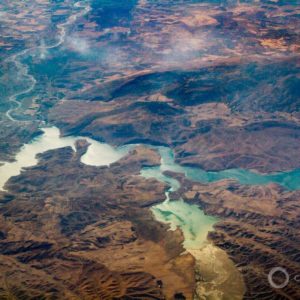Federal Water Tap, June 18: Reclamation Begins Gila River Diversion EIS
The Rundown
Reclamation will review environmental effects of controversial New Mexico water project. Watchdog agency warns Reclamation about insider threats to dam security. Farm Bill passes out of Senate committee. EPA moves forward with WOTUS rule replacement. GAO says that some tribes struggle to operate and maintain water and wastewater systems built by federal grants. House committee approves a bill to restrict legal challenges to a Texas reservoir project. EPA will hold a community meeting in New Hampshire on perfluorinated compounds. And lastly, a Senate committee discusses USAID’s organizational shuffle.
“Our goal with the 2015 rule was that it was not going to be a Lazarus and come back from the dead.” — Scott Pruitt, the EPA leader, on the Waters of the United States rule, which the agency is seeking to kill and rewrite.
By the Numbers
1,006: Pages in the Senate version of the farm bill. (Senate Agriculture Committee)
News Briefs
Reclamation Begins Gila River Diversion Review
The Bureau of Reclamation announced that it will begin studying the environmental consequences of a controversial proposal to divert the Gila River, in New Mexico, just downstream from the nation’s first wilderness area. The water would be stored in reservoirs adjacent to the river.
In context: Gila River Diversion Reaches Decision Point
Pruitt Moves Against WOTUS Rule
Repeal and Replace was the half-truth Republican mantra against the Affordable Care Act. The same rallying cry is being wielded against another Obama-era bugbear: the Waters of the United States rule.
Scott Pruitt, the EPA leader, announced last week that he had sent a replacement rule to the Office of Management and Budget for internal review. In a separate action, the agency is trying to invalidate the existing rule, which has been stayed by federal court.
The EPA press office did not respond to Circle of Blue’s questions about what was sent to OMB. But during a meeting with farm groups in Nebraska on June 14, Pruitt dropped “a few hints” about the rule, DTN reports. Pruitt said that groundwater and prairie potholes — small lakes and wetlands that pepper the northern plains — would not be under the agency’s jurisdiction for Clean Water Act permitting. Groundwater was excluded from the Obama WOTUS rule, and prairie potholes were to be examined case by case.
Senate Committee Passes Farm Bill
After a debacle in the House, where conservative revolt over immigration sunk farm legislation, the Senate moved forward with its own version of the farm bill, which the Agriculture Committee approved on June 13.
The 1,006-page bill authorizes $200 million per year to pay farmers for land and water conservation practices, $200 million per year for flood prevention, $25 million per year to protect drinking water sources from contamination, and $25 million per year for “circuit riders” that assist rural water systems with technical matters.
The bill also includes an amendment from Sen. Sherrod Brown (D-OH) that would increase federal subsidies for conservation practices that reduce nutrient runoff to lakes, river, and groundwater. Brown represents Ohio, where extra vitamins in Lake Erie pump up algal blooms in the summer.
The Senate is expected to debate the bill before the July 4 holiday.
Perfluorinated Chemicals Study in Defense Bill
Led by Ohio’s delegation, a bipartisan group of senators filed an amendment to a Defense Department spending authorization bill that would require the Department of Health and Human Services to release a health study on perfluorinated chemicals. News agencies have reported that the study suggests perfluorinated chemicals are harmful at levels lower than the EPA’s guidelines.
Sens. Sherrod Brown and Rob Portman also co-signed a letter to the HHS and EPA with eight other senators asking for release of the study.
Barriers to Challenging Texas Reservoir
A bill that would limit legal challenges to a municipal reservoir proposed for northern Texas moved out of House committee.
The Lower Bois d’Arc Creek Reservoir was approved earlier this year by the Army Corps of Engineers. Rep. Sam Johnson (R-TX) introduced the bill, which limits the time for citizens to object to the project’s environmental review. It also restricts who is eligible to sue to those who filed comments in the public review period.
The first lawsuit against the project’s approval was filed in May by landowners whose property would be flooded.
Studies and Reports
Dam Threats Come from the Inside
In a review of cybersecurity preparedness at two critical dams managed by the Bureau of Reclamation, an inspector general’s report found that the more significant risk is internal — from employees and contractors who already have the keys to the vault, so to speak.
The inspector general found that digital intrusions into the systems that control generators, gates, and valves were a low risk because those systems were isolated from the internet. In recent years these systems have been increasingly connected to computers, which make them easier to operate but also easier to hack.
Reclamation, however, was paying less attention to insider threats. The report asserts that too many employees had access to key computer controls while background checks for those employees were not rigorous enough.
Reclamation did not agree with three of the report’s five recommendations for strengthening internal controls over access to operating systems. The agency argued that its practices are in line with industry standards and federal policy.
Critical dams are those that would destabilize national security, economy, or safety if they were to be destroyed or incapacitated. The Department of Homeland Security reported 290 cyberattacks against critical U.S. infrastructure — energy systems, telecommunications, chemical facilities and the like — in fiscal year 2016, according to the report.
In context: Water Sector Prepares for Cyberattacks
Water and Sanitation in Indian Country
Federal agencies that fund water and sanitation projects for Native American tribes do not have policies in place that would prioritize the most serious needs, according to a Government Accountability Office report.
In 2016, federal agencies spent $370 million on tribal water and sanitation projects. Most of that was channeled through the Indian Health Service and the U.S. Department of Agriculture, but the way the agencies rank projects for funding can led to those with high costs per home to be pushed down the list.
The report also found that tribes struggle to raise funds to operate and maintain water and wastewater systems that are built with outside money.
On the Radar
USAID Redesign Hearing
On June 20, the Senate Foreign Relations Committee holds a hearing on the U.S. Agency for International Development’s internal reorganization. Some observers are concerned about how water programs will be handled after the shuffle.
In context: In USAID Redesign, Water Is Grouped with Food and Climate
PFAS Meeting in New Hampshire
On June 25 and 26, the EPA will hold a public meeting in Exeter, New Hampshire to discuss perfluorinated chemicals in drinking water. Exeter is near Pease Air National Guard Base, a source of contamination.
Registration is available to secure a three-minute speaking slot.
U.S., Canadian Officials Negotiate Missouri River Basin Dispute
The Bureau of Reclamation and authorities from the Canadian province of Manitoba are working through a dispute over a rural water supply project in North Dakota that Manitoba fears could introduce unwanted aquatic species into its watershed, the Associated Press reports.
The Northwest Area Water Supply project will deliver water to communities in rural North Dakota. The water will be taken out of the Missouri River watershed and end up in rivers that flow into Hudson Bay, in Canada.
Federal Water Tap is a weekly digest spotting trends in U.S. government water policy. To get more water news, follow Circle of Blue on Twitter and sign up for our newsletter.
Brett writes about agriculture, energy, infrastructure, and the politics and economics of water in the United States. He also writes the Federal Water Tap, Circle of Blue’s weekly digest of U.S. government water news. He is the winner of two Society of Environmental Journalists reporting awards, one of the top honors in American environmental journalism: first place for explanatory reporting for a series on septic system pollution in the United States(2016) and third place for beat reporting in a small market (2014). He received the Sierra Club’s Distinguished Service Award in 2018. Brett lives in Seattle, where he hikes the mountains and bakes pies. Contact Brett Walton






Leave a Reply
Want to join the discussion?Feel free to contribute!